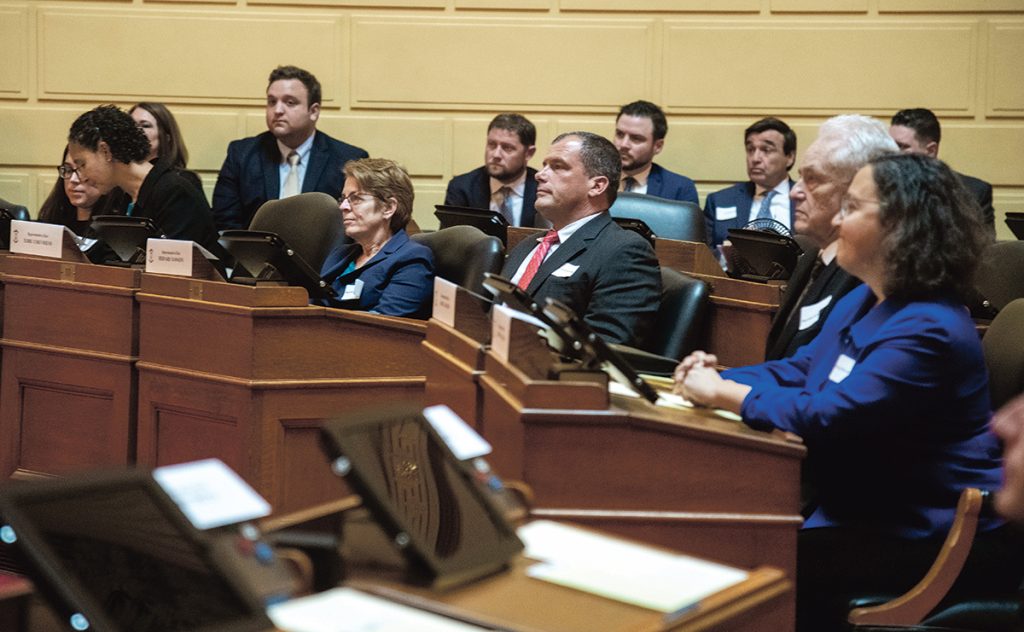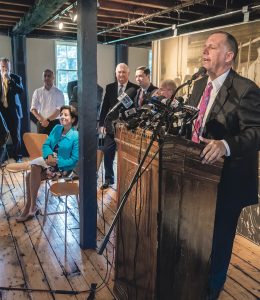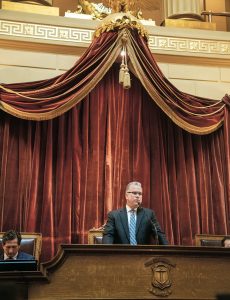The General Assembly reopened Jan. 1 with a new configuration of legislators facing many of the same issues that have been circulating in the state for years, including a potential expansion of sports gambling and the continued phaseout of an automobile excise tax.
The top Democratic leaders all won re-election handily. But although voters returned Gov. Gina M. Raimondo, House Speaker Nicholas A. Mattiello and Senate President Dominick J. Ruggerio to public office, they also elected a legislative assembly that has more women, representatives of color and divergent views.
How these new voices influence the traditions of Rhode Island lawmaking will play out in the coming months. One of the still-undetermined political questions relates to how much power will remain centralized in the House speaker, who can decide what measures are advanced for consideration.
Mattiello has said his top budget priority remains continuing the phaseout of the auto excise tax, which he’d like to see completely eliminated by 2024.
Other issues are more specific to industries and economic development, and how the state attracts and retains its employers.
How can the state attract new job creators while encouraging growth in existing industries? How can state revenue be increased to offset a stubborn structural deficit? Should the state continue its recent effort to make college more affordable, or turn its attention to reform at the K-12 level? Will legislators support more progressive issues being pursued by some members, including safeguards for the environment and women’s rights?
Wendy Schiller, professor and chair of the political science department at Brown University, said just as with the Democrats at the national level, the majority party in the General Assembly will be more diverse than in previous years, and more demanding that the legislature address issues over a range of topics.
Among the most likely: a minimum-wage increase, hot-button issues such as abortion and gun control, and potentially legalized marijuana.
Raimondo, who now leads the Democratic Governors Association, could be under new pressure herself, Schiller said in an email, “to put some issues on the agenda in Rhode Island that are dominating the Democratic Party in other states as well.”
What’s in store? Here are a few of the issues most likely to come up in the next six months:
[caption id="attachment_246432" align="alignright" width="264"]

SPORTS BETTING: Pictured is the new sports-betting facilities at Twin River Casino Hotel in Lincoln. The expansion of sports betting to mobile options is expected to be introduced in the General Assembly this year.
/ PBN PHOTO/MICHAEL SALERNO[/caption]
NEW REVENUE
Look for a bill on mobile sports betting to be introduced quickly. Ruggerio has identified it as one of his top issues.
Sports betting began at the two casinos in Rhode Island this past fall, an expansion of gaming authorized by legislators last session.
Legislators now want to expand that to connect to mobile users, who wouldn’t have to walk into a casino to place a bet. So far, that hasn’t stopped people from crossing state lines to reach Rhode Island’s casinos.
“It doesn’t seem like it’s an impediment,” Ruggerio said. “People have been coming in from Massachusetts. Sixty percent of the people who are putting up sports wagers now are from out of state. That’s more than I expected. People are coming in from New Hampshire to place wagers.”
How much money could the state gain from mobile sports betting? Rhode Island expects to take in $27.3 million from casino-based sports betting in fiscal 2020, according to the figure released as part of the November revenue-estimating conference.
No estimate has been released for mobile bets made within the state.
Although the R.I. Department of Revenue has not yet tallied the casino-based haul this fiscal year, the state gets 51 percent of the net revenue from sports betting, under a contract negotiated between the state, casino owner Twin River Management Group Inc. and IGT Global Solutions Corp., which is the technology vendor.
That’s one of the highest tax rates for sports betting in the country.
Another potential option for new revenue, recreational marijuana, appears to be a distant possibility.
Massachusetts legalized the product and stores started opening in November. In the first 12 days, $4.8 million was sold in two shops. The state collected 17 percent sales and excise taxes, according to The Boston Globe.
So far, Rhode Island legislative leaders are taking a wait-and-see stance. “I’m keeping an eye on Massachusetts to see what develops over there,” Ruggerio said.
He cited concerns that include the inaccuracy of gauging toxicity for drivers, enforcement of who ingests edibles once brought into a home and the impact of marijuana use on employers.
Mattiello, in an emailed response, said the state needs to determine what the net effect of recreational marijuana might mean. “The sale of recreational marijuana will raise revenue for our state, but it will also increase social costs and public-safety concerns. We will have to determine what the net impact would be for Rhode Island in light of the legal sales in Massachusetts and other states.”
Raimondo, whose spokesman said she was unavailable for an interview, has previously said she would be open to a public referendum on legalization of recreational marijuana.
I-195 DISTRICT
One of the more interesting debates may unfold over zoning authority. Although traditionally a local issue, the matter of who gets to decide what is built in state-owned lands, most prominently the I-195 Redevelopment District in downtown Providence, is expected to be a priority issue.
Ruggerio, upset by the review that Providence gave the Hope Point Tower project, which included a mayoral veto of the zoning that was eventually granted for the skyscraper by the Providence City Council, is targeting all state-owned lands.
“I’m concerned about municipalities having control over state property,” he said. “That’s not just Providence. I don’t think they should be involved in the process. … The future of Rhode Island is now. We have a lot of land. We have to do these things now.”
The new House minority leader, Rep. Blake A. Filippi, R-New Shoreham, is supportive of the change, with a caveat. He’d want to see the loss of zoning control tied to whether a community generates more taxes for the state than it consumes.
Providence, despite being the center of business activity in Rhode Island, is on the receiving end of that equation, he said.
“The entire state … has an interest in Providence. Not just because it’s our capital city, but because we massively subsidize the operations of this city, up to $300 million in state aid,” Filippi said.
“The people who I represent – Block Island, South Kingstown and Westerly – are funding the operations [of Providence]. … What they’re doing by inhibiting development is affecting all of the other communities, financially,” he said.
[caption id="attachment_246434" align="aligncenter" width="696"]

Freshmen House representatives attend an orientation at the Statehouse in Providence, as they prepare for the new legislative session.
/ PBN PHOTO/
MICHAEL SALERNO[/caption]
R.I. PROMISE
In a campaign promise, Raimondo in July said she would propose an expansion of the R.I. Promise program, now in its second year, to include options for four-year bachelor’s degrees.
The pathway would allow students to move from the associate programs at the Community College of Rhode Island, now offered to full-time students tuition-free, to the final years at Rhode Island College or University of Rhode Island.
In addition, Raimondo said she would open the free tuition at CCRI to older adults enrolled part time, or those taking at least six credits annually.
Educational leaders support the proposed expansion, including Rhode Island College President Frank Sánchez, whose institution had a decline in enrollment of students in 2017, when the Promise program began.
The estimated cost of the expansion – $35 million a year – is a concern to some legislators. Several have suggested the state should be examining K-12 academic reform instead of college tuition.
Mattiello said when the assembly included the governor’s program in the budget in 2017, it was a four-year pilot for CCRI. “I don’t know that it has been effective yet,” he said, in an email. “Let’s give it another cycle or two and see what the numbers are and see the outcomes. … One of the things I’m concerned about is the sustainability of an expansion and making sure the four-year schools have the resources to be competitive and continue to be places that our citizens can be proud of.”
Raimondo in August said the program is an incentive for students in high school to do well.
Ruggerio and Mattiello have both cited concern about the cost factor.
“We’re looking at a $160 million deficit this year,” Ruggerio said. “I don’t want to encourage anyone to put any new programs in until we have the revenue to afford it.”
Filippi thinks Raimondo is focused on the wrong level of education.
“I don’t support it at all,” he said of expanding R.I. Promise, before citing the state’s K-12 performance on the new standardized examinations. Among other findings, the Rhode Island Comprehensive Assessment System scores found only 34 percent of students in grades three through eight met or exceeded state standards in English. Just 27 percent met or exceeded the standards for math, according to the R.I. Department of Education results.
“The state testing for our state elementary and [middle] schools was abysmal,” Filippi said. “We should be focusing our efforts on fixing our public schools before we spend money on providing a free college education.”
[caption id="attachment_246430" align="aligncenter" width="696"]

ORIENTATION: Senate President Dominick J. Ruggerio, right, shakes hands with Sen.-elect Sam Bell, a Democrat who will represent Providence, as Senate Chief of Staff Stephen Iannazzi looks on during an orientation session for new members in the Senate chambers at the Statehouse.
/ PBN PHOTO/MICHAEL SALERNO[/caption]
CORPORATE INCENTIVES
The changing makeup of the General Assembly may bring a more jaundiced look at corporate incentives.
Democrats who identify themselves as progressives, as well as Republicans, are highly critical of the policies of the past four years that have provided financial incentives for corporations that expand in Rhode Island, or that are building new structures.
The corporate incentives, provided under the fiscal budget of R.I. Commerce Corp., have been reduced from initial-year expenditures over the past two years.
Raimondo has yet to reveal her proposed budget for the fiscal year that begins in July. But through her successful re-election campaign, she defended the use of corporate tax and relocation incentives.
The point the state stops is the point when all other states stop, she said, in an interview prior to the Democratic primary in September. “Every other state uses these incentives,” she said.
Will opponents of incentives find more traction this year? The numbers may be in their favor.
For the budget to pass the House, Filippi pointed out, 50 of the 75 representatives need to approve it.
House Republicans now number nine, fewer than before the November election. But Filippi said the caucus will form coalitions where needed to advance their agenda this year.
Twenty Democratic representatives in the House are aligned with the progressive policy agenda.
“You subtract our nine, it brings you to 46,” he said.
Will it give the Republicans more leverage this year?
“I don’t want to say leverage,” Filippi said. “We don’t go up there and squeeze people. But it is a numbers game. … We plan to work with the progressives, conservatives, whoever, to do what’s in the best interests of Rhode Island.”
Among those interests, he said, is a reduction in the estate tax, potentially to at least align it with the federal exemption of anything up to $11.5 million in assets.
Rhode Island now taxes estates valued at $1.5 million or greater, he said.
And corporate incentives?
The state needs to move away from its policies of centralized government assistance for specific companies, he said, adding Pawtucket-based Hasbro Inc. – which this year is the focus of retention talks – is the latest example.
“We’ve instituted a lot of policies that keep capital from being invested here, that make it unfriendly for capital to remain here,” Filippi claimed. “Largely, the numbers don’t work [for major business expansions] unless you get a government handout.”
[caption id="attachment_246433" align="alignright" width="260"]

SEEKING AID: Gov. Gina M. Raimondo, sitting, and officials listen as Pawtucket Mayor Donald R. Grebien speaks about the Pawtucket Red Sox leaving the city in 2021 during a press conference at Slater Mill. Grebien is now looking for help from the state to ensure Hasbro Inc., which wants a modern headquarters in the vicinity of its current Pawtucket headquarters, doesn’t also leave.
/ PBN FILE PHOTO/MICHAEL SALERNO[/caption]
The toymaker has said it wants a modern headquarters “in the vicinity” of its Pawtucket headquarters but has not said publicly what, if anything, it wants from state and/or city leaders.
Filippi would like to see government incentives directed at specific industries that have high-growth potential, including artificial intelligence and robotics, and have broad government tax reform aimed at attracting and retaining those companies.
Mattiello said he’s working closely with the governor and Senate president “to provide the tools and equity that are necessary to keep Hasbro in Rhode Island.”
Pawtucket Mayor Donald R. Grebien said he’s already spoken with Ruggerio and Mattiello about Hasbro, and the impact that a move from Pawtucket could have on both his community and East Providence. Grebien is still smarting from last year’s announcement that the Pawtucket Red Sox will leave the city in 2021.
His legislative delegation was planning to meet in late December to discuss specific strategies that could attract new business to Pawtucket and retain Hasbro.
Some of the options include expanding the community’s “growth center” to include McCoy Stadium, Memorial Medical Center and the downtown, and offering state incentives, such as tax credits or federal Opportunity Zone tax credits.
The city is also hoping to see legislation approved that would create a Tax Incremental Financing district for arts-related businesses.
“We need a shot right now in the arm,” Grebien said. “And hopefully that is what we’re getting from the state.”
PROGRESSIVE REFORM
Rhode Island Progressive Democrats of America, a Pawtucket-based PAC that endorsed about one-third of the sitting assembly, has several issues it plans to pursue again this year, including the codifying of women’s reproductive rights in case the Roe v. Wade decision is overturned by the new U.S. Supreme Court.
This year, the political action committee also plans to introduce a package aimed at environmental protections.
Last year, the group made little headway at the Statehouse. Mattiello has said he doesn’t think Roe v. Wade will be overturned. The bill to codify those rights in Rhode Island was not brought to the House floor for a vote.
Progressive Democrats state coordinator Nate Carpenter said the speaker doesn’t have broad support for his position.
“When you look at what the constituents want, versus what Mattiello is pushing, they’re two different things,” he said. “It’s a question of how many people we can get there and how much pressure we can place on these politicians to show them how much this means to us.”
Georgia Hollister Isman, who leads the Rhode Island Working Families Party, expects a more progressive agenda to be reintroduced this session.
“To anyone paying good attention, there is a very clear mandate from voters … for an economic agenda that really prioritizes working men and women and does some things that are sometimes controversial at the Statehouse but are common sense to voters, [such as] raising the minimum wage to $15,” she said.
Rhode Island’s minimum wage is $10.50 per hour. Massachusetts has a $12 per hour minimum wage.
“So we start losing workers,” Isman said. “If you could drive 20 minutes to get a wage that is significantly higher, you probably would.”
Mike Stenhouse, CEO of the Rhode Island Center for Freedom and Prosperity, a think tank that promotes free-market policies, said he’s worried about the new session.
[caption id="attachment_246435" align="alignright" width="230"]

WELCOMING NEW MEMBERS: House Speaker Nicholas A. Mattiello addresses freshmen lawmakers during an orientation meeting at the Statehouse in Providence. Mattiello said his top priority remains the elimination of the automobile excise tax. / PBN PHOTO/MICHAEL SALERNO[/caption]
Although Mattiello has described himself as a “firewall” against ultra-left groups during the campaign and immediately after, Stenhouse said he’s allowed progressive policies to take effect in Rhode Island.
He cited the every-other-year increases in the minimum wage and the approval of paid leave for all employees.
“The problem is, in recent years, [Mattiello] has not been a firewall. He’s been a leaky dam. We’ve had a lot of progressive-left legislation come through,” said Stenhouse.
Another potential impact of the new membership centers around changes to the House rules, which are voted on by House members and determine how the chamber works.
Traditionally, these rules have favored a strong speakership, according to John Marion, executive director of Common Cause Rhode Island.
What’s changed this year is that a group of 20 Democratic representatives have spoken broadly about the need for reform.
“As they exist now, those rules put tremendous power in the speaker’s office,” Marion said. And historically, representatives have had little incentive to challenge that system.
“What’s different this year is you have the critical mass” generally supporting reform, Marion said.
Mary MacDonald is a staff writer for the PBN. Contact her at Macdonald@PBN.com.
















